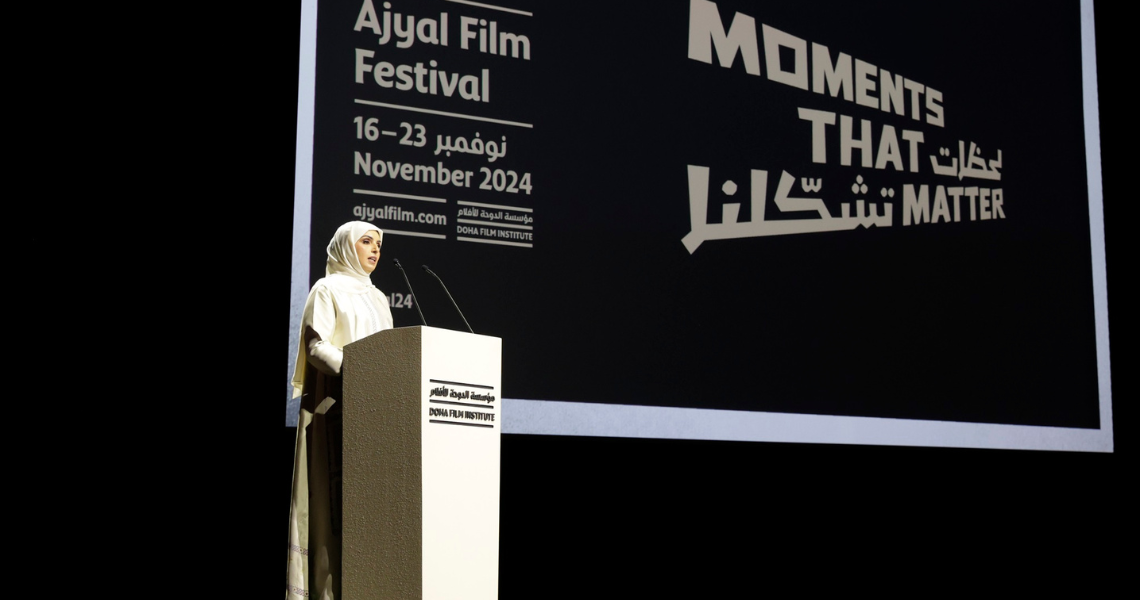Fatma Hassan Alremaihi, CEO of Doha Film Institute (DFI) and Festival Director of 2024 Ajyal, said the organisation has built a sustainable ecosystem for Arab and independent cinema, underpinned by its commitment to supporting creative expression, particularly during challenging times.
At an Ajyal 2024 media briefing, Alremaihi said, “film festivals are now more important than ever as they have become the microphone for the people in a world of silence,” adding that “DFI’s commitment to cinema extends beyond entertainment, viewing film festivals as catalysts for positive societal change.”
"On opening night, everyone who spoke to me told me that they had never been to a festival where people can voice their opinion or voice issues like they can here. They said it is really refreshing and that should be the norm of film festivals. Unfortunately, it is not.
“Film festivals are there to make people's lives better, to make societies better. There's a mission behind it. It's not just to bring films to entertain, but to bring films that will impact us," Alremaihi said.
Building on this year's success, as DFI prepares to host the 2025 Doha Film Festival, Alremaihi said the core mission and programmes would remain intact while expanding to embrace new opportunities. "Nothing is changing in the sense that we are replacing Ajyal. This is simply the next stage of our festival, the next stage of our industry, and the next stage of the Institute," she said. "We have always been evolving and adapting to industry needs”.
Under the leadership of H.E. Sheikha Al Mayassa Bint Hamad Bin Khalifa Al-Thani, Chairperson, DFI has expanded its scope beyond conventional approaches, added Alremaihi. "Our chairperson is incredibly invested in this. When she sees the value in a concept, she's always pushing us to make it bigger and transform it into a continuous initiative.”
Reflecting on DFI’s journey, Alremaihi described its success: "We worked really hard over the past 14 years to create a sustainable ecosystem that has proven results, we have discovered a formula that works and are continuously building on that.”
The Institute’s commitment to year-round engagement is evident through various initiatives including the Ajyal Film Club and Ajyal Show podcast. "Everything we start at Ajyal has taken on a life of its own to become a year-round programme with sustained impact," e She said that DFI’s role in nurturing local talent has shown remarkable results, particularly through the Made in Qatar programme. “It has evolved from showcasing locally-made films to include projects developed in Qatar but produced elsewhere, demonstrating our flexible approach to supporting creative talent.
Reflecting on Ode to Our Land, directed by two young Qatari women filmmakers, Amal Al Muftah and Rawda Al-Thani, she said: “The film took four years of work, but we were able to convey its message with the support of our talented Qatari female directors. We believed in their vision and gave them the confidence they needed because they possess exceptional talent and can achieve anything, as evident in the film. Currently, we are working on other projects under Made in Qatar, featuring diverse local and global stories and ideas.
Speaking about regional partnerships, Alremaihi said DFI is honoured to have brought Ajyal Film Club to Morocco for the first time to the city of Tangier. “I was impressed by the Moroccan jurors—their critiques, eloquence, and way of thinking were remarkable. We look forward to building future partnerships with Morocco.”
She commented that DFI’s longstanding support to Palestinian cinema remains unwavering. “Whatever we do will never be enough to bring their voices to the world. . We have been supporting cinema from the region for the last 14 years and Palestine has always been an integral part of that contribution. It is important for us to amplify the stories that matter, and show them to the world.
Highlighting another significant achievement, Alremaihi noted that DFI's global impact has been independently validated by a Sorbonne University study that identified Qatar as the world leader in supporting women filmmakers with a presence at international festivals.
“The significant progress of the role of Arab women in leadership showcases our incredible talent and creativity. The perception that women in film in the West have greater opportunities is inaccurate, only 9% of female directors compared to 27% in the Arab world.
"DFI’s impact is now global but we will continue to aim to generate more creative power not only for women, but for all underrepresented voices," Alremaihi concluded.



